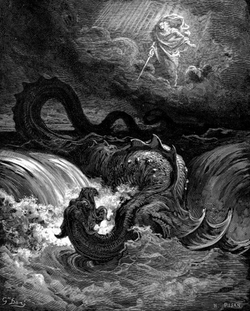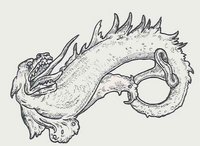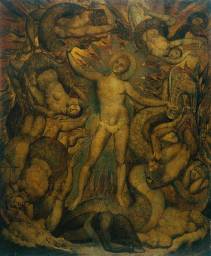Leviathan (לִוְיָתָן "Twisted; coiled", Standard Hebrew Livyatan, Tiberian Hebrew Liwyāṯān) was a Biblical sea monster referred to in the Old Testament (Psalms 74:13-14; Book of Job 41; Isaiah 27:1).
The word leviathan has become synonymous with any large monster or creature. In Modern Hebrew, it simply means "whale".
Family
Scattered through the Prophets and Holy Writings (the two latter portions of the Hebrew Bible) are allusions to ancient myths whose origins may well be outside of the Judaic tradition- for instance the primordial combat between Yahweh and a monster variously named Leviathan, Rahab, or simply Dragon. A Canaanite poem from Ras Shamra (ancient Ugarit) in northern Syria records a battle between the god Baal and another monster called Leviathan. Hittite myths contain accounts of a battle between the weather god and the dragon Illuyankas, and the Babylonians told of a fight between their god Marduk and the monster Tiamat. The Leviathan was believed, by ancient people, to be the cause of solar eclipses. They believed that the sun was covered because the Leviathan used to eat it for that period of time.
Judaism
The word "Leviathan" appears five times in the Bible:
- Isaiah 27:1: "In that day the Lord with his sore and great and strong sword shall punish leviathan the piercing serpent, even leviathan that crooked serpent; and he shall slay the dragon that is in the sea."
- Psalms 74:14: "Thou didst crush the heads of the Leviathan, thou didst give him for food to the desert people."
- Psalms 104:25,26: "O Lord, how manifold thy works, in wisdom you have created them all. So is this great and wide sea... there go the ships and the Leviathan which you have created to play with";
- Book of Job 3:8 "Lo let the night be solitary, let no joyful cry be heard in it. Let them curse it who curse the day who are ready to awake the Leviathan";
- Book of Job 41:1-34: "Can you draw out a Leviathan with a hook or press down its tongue with a cord? Canst thou put a hook into his nose? or bore his jaw through with a bridle ring? Will he make many supplications to thee? Will he speak soft words to thee? Will he make a covenant with thee? To take him for thy servant forever? Will thou play with him as with a bird? Or wilt thou bind him for thy girls? Will the tradesmen heap up payment for him?... Lay thy hand upon him, thou will no more think of fighting. Behold the hope of him is in vain, shall not one be cast down even at the sight of him? None is so fierce that dare stir him up. who then is able to stand before me?...Who can open the doors of his face? His teeth are terrible round about. His scales are his pride, shut up together as with a close seal. One is near to the another, that no air can come between them. They are joined one to another, they stick together, that they cannot be sundered. By his [sneezing] a light doth shine, and his eyes are like the eyelids of morning. Out of his mouth go burning lamps, and sparks of fire leap out. Out of his nostrils goeth smoke, as out of a seething pot or caldron. His breath kindleth coals, and a flame goeth out of his mouth....His heart is as firms as stone; yea, as hard as a piece of the nether millstone....He esteemeth iron as straw, and brass as rotten wood. The arrow cannot make him flee: slingstones are turned with him into stubble....He maketh the deep to boil like a pot....he is a king over all the children of pride."
The word Leviathan is also mentioned in Rashi's commentary on Genesis 1:21: "God created the great sea monsters - Taninim." Jastrow translates the word "Taninim" as a "sea monster, crocodile or large snake". Rashi comments: "According to legend this refers to the Leviathan and its mate. God created a male and female Leviathan, then killed the female and salted it for the righteous, for if the Leviathans were to procreate the world could not stand before them."
In the Talmud, the Leviathan is mentioned a number of times:
- Avoda Zara (3b): "Rav Yehuda says, there are twelve hours in a day. The first three hours God sits and learns the Torah, the second three hours he sits and judges the world. The third three hours God feeds the entire world... the fourth three hour period God plays with the Leviathan as it is written: "the Leviathan which you have created to play with".
- Moed Katan (25b): "Rav Ashi said to Bar Kipok: what will be said at my funeral? He answered: "If a flame can fall a cedar, what hope does a small tree have? If a Leviathan can be hooked and hauled to land, what hope has a fish in a puddle?"
The festival of Sukkot (Festival of Booths) concludes with a prayer recited upon leaving the sukkah (booth): "May it be your will, Lord our God and God of our forefathers, that just as I have fulfilled and dwelled in this sukkah, so may I merit in the coming year to dwell in the sukkah of the skin of Leviathan. Next year in Jerusalem."
A commentary on this prayer in the Artscroll prayer-book (p. 725) adds: "The Leviathan was a monstrous fish created on the fifth day of Creation. Its story is related at length in the Talmud Baba Bathra 74b, where it is told that the Leviathan will be slain and its flesh served as a feast to the righteous in [the] Time to Come, and its skin used to cover the tent where the banquet will take place."
There is another religious hymn recited on the festival of Shavuot (celebrating the giving of the Torah), known as Akdamut, wherein it says: "...The sport with the Leviathan and the ox (Behemoth)...When they will interlock with one another and engage in combat, with his horns the Behemoth will gore with strength, the fish [Leviathan] will leap to meet him with his fins, with power. Their Creator will approach them with his mighty sword [and slay them both]." Thus, "from the beautiful skin of the Leviathan, God will construct canopies to shelter the righteous, who will eat the meat of the Behemoth [ox] and the Leviathan amid great joy and merriment, at a huge banquet that will be given for them." Some rabbinical commentators say these accounts are allegorical (Artscroll siddur, p. 719), or symbolic of the end of conflict.
Legend has it that in the banquet after the end of conflict, the carcass of the leviathan will be served as a meal, along with the behemoth and the ziz.
Leviathan may also be interpreted as the sea itself, with its counterparts behemoth being the land and ziz being the air and space. Some scholars have interpreted Leviathan, and other references to the sea in the Old Testament, as highly metaphorical references to seafaring marauders who once terrorized the Kingdom of Israel. Others liken the mention to Tiamat and other similar monsters who represented the sea as a foe to the gods in myths of nearby cultures.
The Biblical references to Leviathan appear to have evolved from the Canaanite Baal cycle involving a confrontation between Hadad (Baal) and a seven headed sea monster named Lotan. Lotan is the Ugaritic orthograph for Hebrew Leviathan. Hadad defeats him. Bibilical references also resemble the Babylonian creation epic Enûma Elish in which the storm god Marduk slays his mother, the sea monster and goddess of chaos and creation Tiamat and creates the earth and sky from the two halves of her corpse.
Christianity
The Christian interpretation of Leviathan is often considered to be a demon or natural monster associated with Satan or the Devil, and held by some to be the same monster as Rahab (Isaiah 51:9).
Some biblical scholars considered Leviathan to represent the pre-existent forces of chaos. In Psalm 74:13-14 it says "it was You who drove back the sea with Your might, who smashed the heads of the monsters in the waters; it was You who crushed the heads of Leviathan, who left him as food for the creatures of the wilderness. (JPS edition)" God drove back the waters of the pre-existent Earth (Genesis 1:2 "And the earth was formless and void, and darkness was over the surface of the deep, and the Spirit of God was moving over the surface of the waters." ([NAS])
Some interpreters suggest that Leviathan is a symbol of mankind in opposition to God, claiming that it and beasts mentioned in the books of Daniel and Revelation should be interpreted as metaphors. The word Leviathan to the ancient Jews became synonymous with that which warred against God's kingdom. This especially included nations warring against Israel such as Assyria and Egypt. (The Bible Knowledge Commentary, Old Testament,1985, SP Publications Inc.)
Leviathan also appears in the Apocryphal Book of Enoch, giving the following description of this monster's origins there mentioned as being female, as opposed to the male Behemoth:
- And that day will two monsters be parted, one monster, a female named Leviathan in order to dwell in the abyss of the ocean over the fountains of water; and (the other), a male called Behemoth, which holds his chest in an invisible desert whose name is Dundayin, east of the garden of Eden. - 1 Enoch 60:7-8
Some interpreters suggest that Leviathan is a symbol of mankind in opposition to God, claiming that it and beasts mentioned in the books of Daniel and Revelation should be interpreted as metaphors. The usage of Leviathan in the Old Testament books (Isaiah 27:1) would seem to be a reference to a Semitic mythological beast mentioned in Ugaritic literature (of Ugarit, a city-state in North Syria). According to Canaanite myth, the Leviathan was an enemy of order in Creation and was slain by the Canaanite god Baal. The word Leviathan to the ancient Jews became synonymous with that which warred against God's kingdom. This especially included nations warring against Israel such as Assyria and Egypt. (The Bible Knowledge Commentary, Old Testament,1985, SP Publications Inc.)
Leviathan is also sometimes said to have been of the order of Seraphim. According to the writings of Father Sebastien Michaelis, Balberith, a demon who allegedly possessed Sister Madeleine at Aix-en-Provence, obligingly told the priest not only the other devils possessing the nun, but added the special saints whose function was to oppose them. Leviathan was one devil that was named and was said to tempt men into committing sacrilege. Its adversary was said to be St. Peter.
According to St. Thomas Aquinas, Leviathan is the demon of envy and the demon who is first in punishing the corresponding sinners. Some medieval authors, such as Collin de Plancy and Johann Weyer, considered Leviathan to be Grand Admiral of the maritime regions of Hell.
Satanism
In The Satanic Bible, subsequently the final section, the "Book of Leviathan", authored by Anton LaVey, and according to most Satanist groups, particularly LaVeyan Satanism, Leviathan is one of the "Four Crown Princes" and represents the number three, the color blue, man's carnal side and the human element chaos. There, Leviathan's element is water, water being that which human forms are primarily created of. This representing the unity of matter and anti-matter, chaos and order, yin with yang, and Leviathan's direction is west, west being used to represent chaos and disorder.
Leviathan as an animal
In the book of Job, both Behemoth and Leviathan are listed alongside a number of other animals that are clearly mundane, such as goats, eagles, and hawks, leading many Christian scholars to surmise that Behemoth and Leviathan may also be mundane creatures. The animal most often proposed for Leviathan is the Nile crocodile.
Like the Leviathan, the Nile crocodile is aquatic, scaly, and possesses fierce teeth. Job 41:18 states that Leviathan's eyes "are like the eyelids of the morning". Some have compared this verse to a crocodile's eyes, which rise out of the water before the rest of its head, invoking the image of the sun rising over the horizon.
The major difficulty of this view is that in Job chapter 41 Leviathan is described as breathing fire like a dragon.
Another difficulty is that the crocodile does not seem to fit the descriptions of Leviathan given in other Bible passages, e.g. it does not have multiple heads.
Another theory, often cited by cryptozoology, is that Leviathan was an aquatic reptile, such as a Plesiosaurus.
During sea-faring's Golden Age, European sailors saw Leviathan as a gigantic whale-like sea monster, usually a sea serpent, that devoured whole ships by swimming around the vessels so quickly as to create a whirlpool.
Leviathan in literature
Leviathan is the title of Thomas Hobbes' seminal work on the social contract and the creation of an ideal state - the Commonwealth.
The term "Leviathan" is often used as a generic term for anything large and all consuming.
Partly due to the influence of Herman Melville's classic, Moby-Dick, the Leviathan has come to be associated by many with the sperm whale. An example of this is in Walt Disney's depiction of Pinocchio's being swallowed (a la Jonah in the Bible) by Monstro, a sperm whale, despite the fact that in the original, Pinocchio was swallowed by a "Pesce-cane", translated as "dog-fish" or "shark".
In his book, In Search of Prehistoric Survivors, cryptozoologist Dr. Karl Shuker considers the Leviathan to be a myth inspired, at least in part, by sightings of a Mosasaur-type sea monster. Bernard Heuvelmans, in his book In the Wake of Sea Serpents (Dans le sillage des monstres marins) considered the entity to be of the "Marine centipede" type.
According to a Pagan religion, the Leviathan is considered to be the guardian of the city of Atlantis. When the citizens of that world decided to go into hiding, they put the Leviathan under a sleeping spell unless something tried to get too close to or awaken the city, this way, it would not roam the waters, which would ultimately give away the location of their dwelling.
In Paradise Lost, John Milton uses the term Leviathan to describe the size and power of Satan.
Leviathan is an element of the Illuminatus Trilogy by Robert Anton Wilson, the third book of which uses the beast's name as its title.
In Clive Barker's The Hellbound Heart, the ruler of Hell is Leviathan.
See also
External links
- Putting God on Trial- The Biblical Book of Job contains a major section on the literary use of Leviathan.
- Enuma Elish (Babylonian creation epic)
- Philologos concordance page



